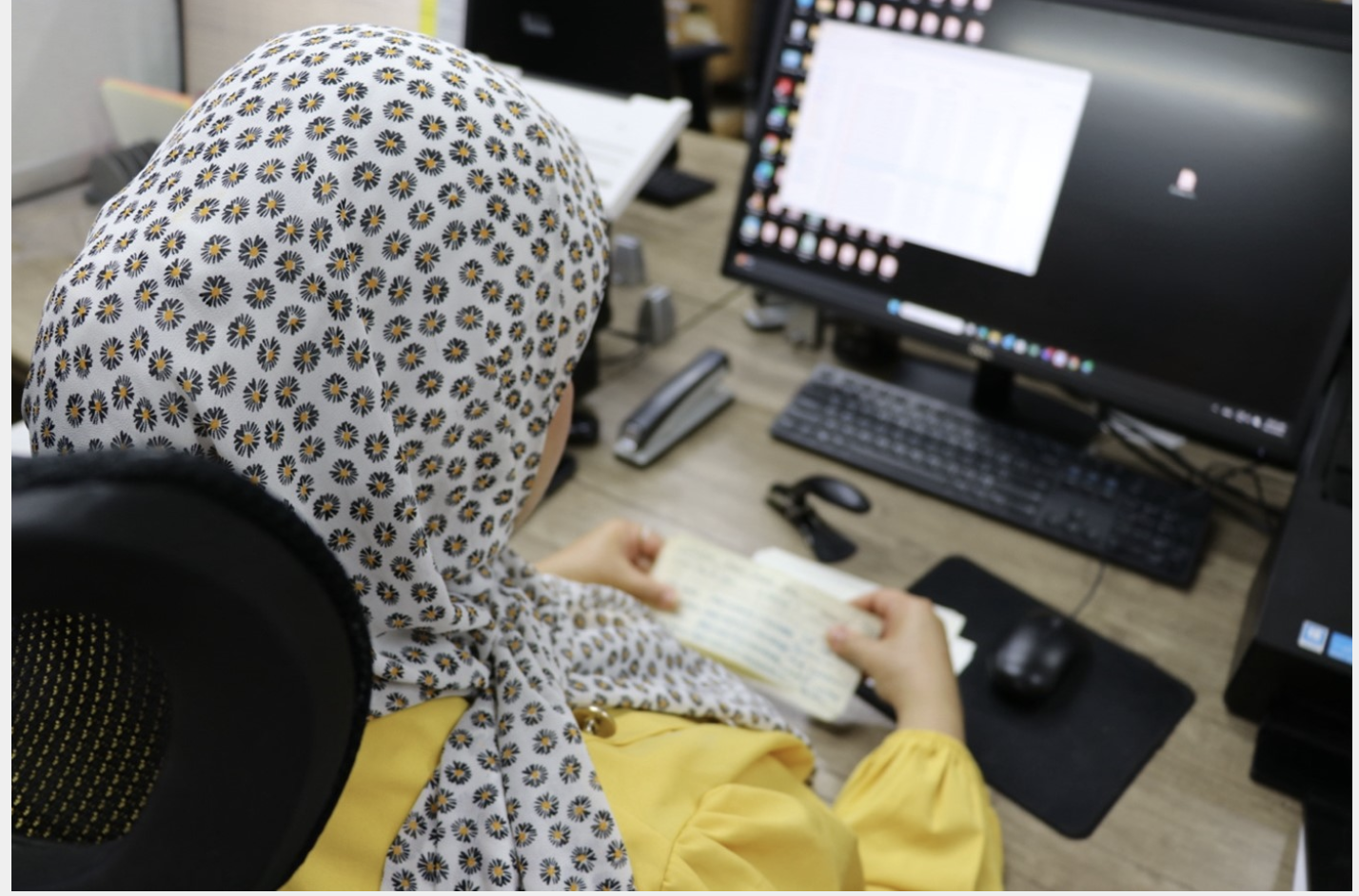05 September 2025
This story was written by Ms Nyika Dutson

Esraa working in UNRWA’s archiving office, Jordan © August 2025 UNRWA photo by Eman Abualragheb
Esraa smiles as she looks through handwritten registration cards on her computer. “I am amazed that so many facts were pencilled on these small cards,” she says. “They show our origins as Palestine Refugees and everything that has happened to our families since 1948.”
UNRWA’s collection of nearly 30 million files holds the family histories of Esraa and six million other Palestine Refugees registered across UNRWA’s five fields of operation: the Gaza Strip, the occupied West Bank including East Jerusalem, Syria, Lebanon, and Jordan.
Touching the fragile cards, Esraa says, “These records make you feel the suffering our families endured, from when they were forced to leave Palestine in 1948 until now, and the suffering they are still living through.”

Esraa scanning and classifying registration cards in UNRWA’s Archive room, Jordan © August 2025 UNRWA photo by Eman Abualragheb
The documents begin with the original registration papers, called master cards, of over 700,000 people who lost their homes and means of livelihood because of the 1948 war supporting evidence, creating an incredibly extensive and detailed refugee archive.
In 2004, UNRWA began digitising these records to prevent them from being lost during conflict or fading over time. Around 20 million documents were scanned, reviewed, and classified between 2004 and 2009, and another 10 million between 2023 and 2025. These are used to retrace family trees, linking Palestine Refugees to their ancestors who were displaced in 1948.
When she began working for UNRWA’s Relief and Social Services Department in 2023, Esraa learnt that UNRWA held records preserving her own family history. She remembers, “I was very happy and sad at the same time knowing these documents exist. They prove that we exist, but they also prove everything we have had to go through.”
Her records date back to 1948, when her grandfather’s family was forced to leave their hometown, Jaffa, a busy port city in Mandatory Palestine. They were forced to resettle almost 100 kilometres east in the Aqbat Jabr refugee camp near Jericho in the West Bank, which was under the control of Jordan from 1950 and then occupied by Israel in 1967. This camp sheltered around 30,000 Palestine Refugees and contained an UNRWA health centre and two schools.
Esraa’s father was born in Jerusalem in 1955. Two years later, in 1957, the family moved almost 100 kilometres away again, settling in Al-Wahdat, also known as Amman New Camp, a camp for Palestine Refugees camp in Jordan’s capital city, Amman.

Esraa scanning and classifying registration cards in UNRWA’s Archive room, Jordan © August 2025 UNRWA photo by Eman Abualragheb
Esraa was born and raised in this camp with three brothers and six sisters. As descendants of Palestine Refugees, Esraa and her siblings were added to their family registration card. Esraa explains “My registration card allowed me to go to school, to get health treatment, to work with UNRWA. It is not just a piece of paper. It allowed me to live.”
Many Palestine Refugees are offered different sets of rights depending on the country they live in and might experience barriers to accessing public services. Registration cards, which since 2023 have been issued electronically through the eUNRWA app, allow them to request updates to their family records and complete digital identity verification as a means to access certain UNRWA services.
Every year, UNRWA receives over 1,000 requests from people seeking to confirm their registration as Palestine Refugees, a process that relies on the archives that Esraa helps preserve. Once the digitisation project is complete, UNRWA plans to make family files accessible to Palestine Refugees themselves.
“These archives help people who want to know their origins, how they came to be, and what happened to their families,” Esraa says. “For younger generations without personal memories of the Nakba, the archives are an important way to learn what displacement, asylum, and life in camps mean. They show what Nakba means.”
For Esraa, working with these archives is deeply important and heartbreaking. “I hope everyone can know how essential this archive is to the lives of every Palestine Refugee,” she says. “The registration card is not just a piece of paper. It is proof that we are here, that we have rights. It shows that we are suffering, but our history cannot be forgotten.”
Document Sources: United Nations Relief and Works Agency for Palestine Refugees in the Near East (UNRWA)
Subject: Armed conflict, Gaza Strip, Jerusalem, Palestine question, Refugees and displaced persons, West Bank
Publication Date: 05/09/2025
URL source: https://www.unrwa.org/newsroom/features/preserving-history-esraa-and-unrwa-archives

